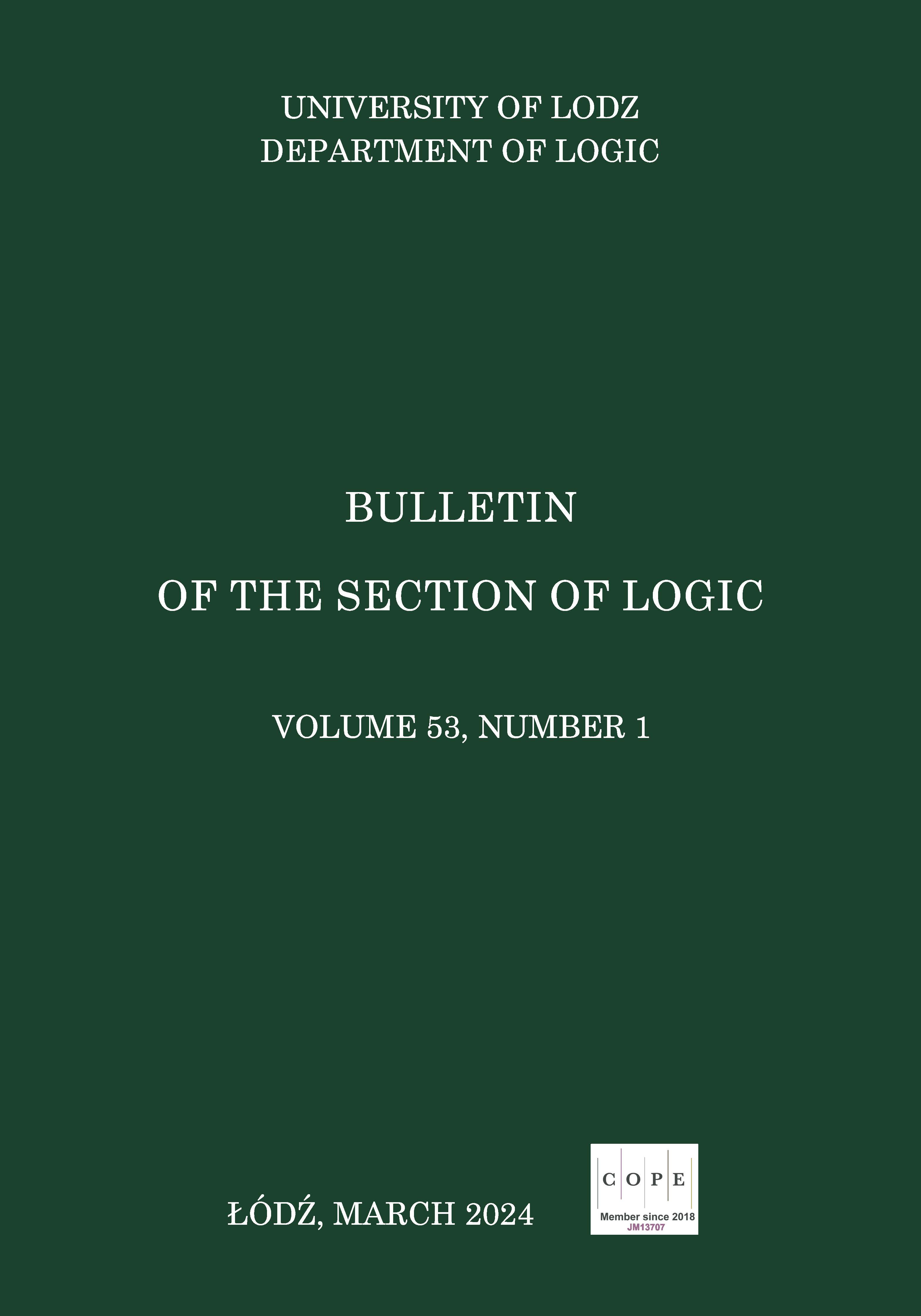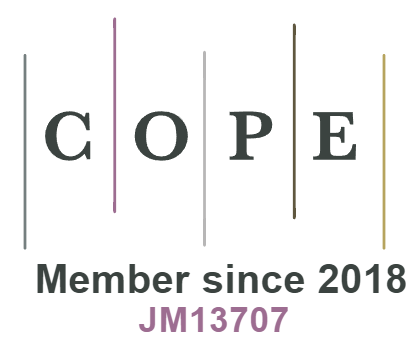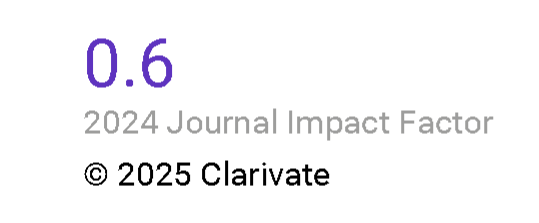Linear Abelian Modal Logic
DOI:
https://doi.org/10.18778/0138-0680.2023.30Keywords:
many-valued logic, modal logic, abelian logic, hypersequent calculus, cut-eliminationAbstract
A many-valued modal logic, called linear abelian modal logic \(\rm {\mathbf{LK(A)}}\) is introduced as an extension of the abelian modal logic \(\rm \mathbf{K(A)}\). Abelian modal logic \(\rm \mathbf{K(A)}\) is the minimal modal extension of the logic of lattice-ordered abelian groups. The logic \(\rm \mathbf{LK(A)}\) is axiomatized by extending \(\rm \mathbf{K(A)}\) with the modal axiom schemas \(\Box(\varphi\vee\psi)\rightarrow(\Box\varphi\vee\Box\psi)\) and \((\Box\varphi\wedge\Box\psi)\rightarrow\Box(\varphi\wedge\psi)\). Completeness theorem with respect to algebraic semantics and a hypersequent calculus admitting cut-elimination are established. Finally, the correspondence between hypersequent calculi and axiomatization is investigated.
References
A. Avron, Hypersequents, logical consequence and intermediate logics for concurrency, Annals of Mathematics and Artificial Intelligence, vol. 4(3) (1991), pp. 225–248, DOI: https://doi.org/10.1007/BF01531058
Google Scholar
DOI: https://doi.org/10.1007/BF01531058
F. Baader, S. Borgwardt, R. Penaloza, Decidability and complexity of fuzzy description logics, KI-Künstliche Intelligenz, vol. 31(1) (2017), pp. 85–90, DOI: https://doi.org/10.1007/s13218-016-0459-3
Google Scholar
DOI: https://doi.org/10.1007/s13218-016-0459-3
S. Baratella, Continuous propositional modal logic, Journal of Applied Non-Classical Logics, vol. 28(4) (2018), pp. 297–312, DOI: https://doi.org/10.1080/11663081.2018.1468677
Google Scholar
DOI: https://doi.org/10.1080/11663081.2018.1468677
E. Casari, Comparative logics and Abelian l-groups, [in:] Studies in Logic and the Foundations of Mathematics, vol. 127, Elsevier (1989), pp. 161–190, DOI: https://doi.org/https://doi.org/10.1016/S0049-237X(08)70269-6
Google Scholar
DOI: https://doi.org/10.1016/S0049-237X(08)70269-6
A. Ciabattoni, G. Metcalfe, F. Montagna, Adding modalities to MTL and its extensions, [in:] Proceedings of the Linz Symposium, vol. 2005, Citeseer (2005).
Google Scholar
A. Ciabattoni, G. Metcalfe, F. Montagna, Algebraic and proof-theoretic characterizations of truth stressers for MTL and its extensions, Fuzzy Sets and Systems, vol. 161(3) (2010), pp. 369–389, DOI: https://doi.org/10.1016/j.fss.2009.09.001
Google Scholar
DOI: https://doi.org/10.1016/j.fss.2009.09.001
P. Cintula, Weakly implicative (fuzzy) logics I: Basic properties, Archive for Mathematical Logic, vol. 45(6) (2006), pp. 673–704, DOI: https://doi.org/10.1007/s00153-006-0011-5
Google Scholar
DOI: https://doi.org/10.1007/s00153-006-0011-5
P. Cintula, C. Noguera, A general framework for mathematical fuzzy logic, [in:] P. Cintula, P. Hajek, C. Noguera (eds.), Handbook of Mathematical Fuzzy Logic, vol. 1, College publications, London (2011), pp. 103–207.
Google Scholar
D. Diaconescu, G. Georgescu, Tense operators on MV-algebras and Łukasiewicz-Moisil algebras, Fundamenta Informaticae, vol. 81(4) (2007), pp. 379–408.
Google Scholar
D. Diaconescu, G. Metcalfe, L. Schnüriger, A Real-Valued Modal Logic, Logical Methods in Computer Science, vol. Volume 14, Issue 1 (2018), DOI: https://doi.org/10.23638/LMCS-14(1:10)2018
Google Scholar
T. Flaminio, L. Godo, E. Marchioni, Logics for belief functions on MV-algebras, International Journal of Approximate Reasoning, vol. 54(4) (2013), pp. 491–512, DOI: https://doi.org/10.1016/j.ijar.2012.08.006
Google Scholar
DOI: https://doi.org/10.1016/j.ijar.2012.08.006
T. Flaminio, F. Montagna, MV-algebras with internal states and probabilistic fuzzy logics, International Journal of Approximate Reasoning, vol. 50(1) (2009), pp. 138–152, DOI: https://doi.org/10.1016/j.ijar.2008.07.006
Google Scholar
DOI: https://doi.org/10.1016/j.ijar.2008.07.006
L. Godo, P. Hájek, F. Esteva, A fuzzy modal logic for belief functions, Fundamenta Informaticae, vol. 57(2-4) (2003), pp. 127–146.
Google Scholar
L. Godo, R. O. Rodrı́guez, A fuzzy modal logic for similarity reasoning, [in:] G. Chen, M. Ying, K. Cai (eds.), Fuzzy Logic and Soft Computing. The International Series on Asian Studies in Computer and Information Science, Springer, Boston, MA (1999), pp. 33–48, DOI: https://doi.org/10.1007/978-1-4615-5261-1_3
Google Scholar
DOI: https://doi.org/10.1007/978-1-4615-5261-1_3
P. Hájek, Making fuzzy description logic more general, Fuzzy Sets and Systems, vol. 154(1) (2005), pp. 1–15, DOI: https://doi.org/10.1016/j.fss.2005.03.005
Google Scholar
DOI: https://doi.org/10.1016/j.fss.2005.03.005
P. Hájek, D. Harmancová, R. Verbrugge, A qualitative fuzzy possibilistic logic, International Journal of Approximate Reasoning, vol. 12(1) (1995), pp. 1–19, DOI: https://doi.org/10.1016/0888-613X(94)00011-Q
Google Scholar
DOI: https://doi.org/10.1016/0888-613X(94)00011-Q
G. Metcalfe, N. Olivetti, D. Gabbay, Sequent and hypersequent calculi for abelian and Łukasiewicz logics, ACM Transactions on Computational Logic (TOCL), vol. 6(3) (2005), pp. 578–613, DOI: https://doi.org/10.1145/1071596.1071600
Google Scholar
DOI: https://doi.org/10.1145/1071596.1071600
G. Metcalfe, N. Olivetti, D. M. Gabbay, Proof theory for fuzzy logics, vol. 36 of Applied Logic Series, Springer, Dordrecht (2008), DOI: https://doi.org/10.1007/978-1-4020-9409-5
Google Scholar
DOI: https://doi.org/10.1007/978-1-4020-9409-5
G. Metcalfe, O. Tuyt, A Monadic Logic of Ordered Abelian Groups, [in:] N. Olivetti, R. Verbrugge, S. Negri, G. Sandu (eds.), Advances in Modal Logic 13, College Publications, London (2020), pp. 441–457.
Google Scholar
R. K. Meyer, J. K. Slaney, Abelian Logic (From A to Z), [in:] G. Priest, R. Routley, J. Norman (eds.), Paracoconsistent Logic, Philosophia Verlag, Munich (1989).
Google Scholar
M. Mio, R. Mardare, R. Furber, Probabilistic logics based on Riesz spaces, Logical Methods in Computer Science, vol. 16 (2020), DOI: https://doi.org/10.23638/LMCS-16(1:6)2020
Google Scholar
M. Mio, A. Simpson, Łukasiewicz μ-calculus, Fundamenta Informaticae, vol. 150(3–4) (2017), pp. 317–346, DOI: https://doi.org/10.3233/FI-2017-1472
Google Scholar
DOI: https://doi.org/10.3233/FI-2017-1472
G. Pottinger, Uniform, cut-free formulations of T, S4 and S5, Journal of Symbolic Logic, vol. 48(3) (1983), p. 900, DOI: https://doi.org/10.2307/2273495
Google Scholar
DOI: https://doi.org/10.2307/2273495
U. Straccia, Reasoning within fuzzy description logics, Journal of Artificial Intelligence Research, vol. 14 (2001), pp. 137–166, DOI: https://doi.org//10.1613/jair.813
Google Scholar
DOI: https://doi.org/10.1613/jair.813
Downloads
Published
How to Cite
Issue
Section
License

This work is licensed under a Creative Commons Attribution-NonCommercial-NoDerivatives 4.0 International License.















